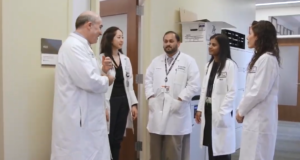 Consultation-Liaison (C-L) psychiatry is one of several subspecialties in which a psychiatrist may choose to concentrate after completing a psychiatry residency program. Brigham and Women’s Hospital’s C-L fellowship program is one of the largest in the country, training six fellows in this critical field of psychiatry every year.
Consultation-Liaison (C-L) psychiatry is one of several subspecialties in which a psychiatrist may choose to concentrate after completing a psychiatry residency program. Brigham and Women’s Hospital’s C-L fellowship program is one of the largest in the country, training six fellows in this critical field of psychiatry every year.
C-L psychiatrists work at the interface of general medicine and psychiatry, either in a hospital or outpatient clinical setting. These specialists are brought in to help treat patients who are coping with psychiatric illnesses while they are being seen for other medical conditions.C-L psychiatrists also help manage patients with behavioral manifestations of medical illness.
“As a quaternary care center with so many subspecialties, we can provide fellows with a wide range of clinics that they can work in,” said Sejal B. Shah, MD, director of the Brigham’s Consultation-Liaison Psychiatry Fellowship. “The number of options that they have in a variety of different areas of medicine is an important part of our program.”
Patients do better when they are treated for psychiatric conditions as well as medical conditions; this is an overarching tenet at the Brigham. Making psychiatry a primary component of medicine is a vital part of the Brigham’s effort to bring the best care to patients in all aspects of their lives. The C-L fellowship is an outgrowth of the Brigham’s leadership role in this field.
Within the fellowship, there are two tracks: Four fellows train in general C-L psychiatry, while two train in psycho-oncology. The psycho-oncology program, which is run in conjunction with Dana-Farber Cancer Institute, gives trainees subspecialty expertise in many facets of managing cancer care.
“There are a number of unique aspects to working with patients who have cancer, including coping with disease recurrence and metastatic cancer,” Dr. Shah said. “The Dana-Farber Cancer Institute is a crown jewel within our system, and we feel it’s important to take advantage of that by training people in this important subspecialty,”
C-L fellows have opportunities to develop relationships with colleagues across many different medical services as well as with patients.
“Some of the cases we see are in the context of urgent psychiatric care, but more commonly we’re providing our services on an ongoing, as-needed basis throughout the duration of a patient’s medical care,” Dr. Shah said. “We capture patients while they’re in the medical setting and help to stabilize them psychiatrically for a period of time while they’re being treated for these other medical conditions.”
The majority of trainees in the Brigham’s C-L fellowship program choose to stay within the specialty after they move on. Former fellows have gone on to academic medicine programs around the United States, where they now play important leadership roles and train medical students, residents and fellows.
The C-L fellowship is just one of several training programs in psychiatry at the Brigham. The others are the Addiction Psychiatry Fellowship, which is jointly offered with Massachusetts General Hospital and McLean Hospital; an ACGME-accredited program in Geriatric Psychiatry; Neuropsychiatry and Behavioral Neurology; Neuropsychology; and Women’s Mental Health.
“One thing that’s special about our training programs is that many of the physicians on our service are nationally recognized leaders in their fields,” said Robert J. Boland, MD, a psychiatrist and vice chair for education in the Department of Psychiatry. “Fellows appreciate that they get to train with these senior psychiatrists as their mentors, and it’s a big reason why our programs are so sought after.”